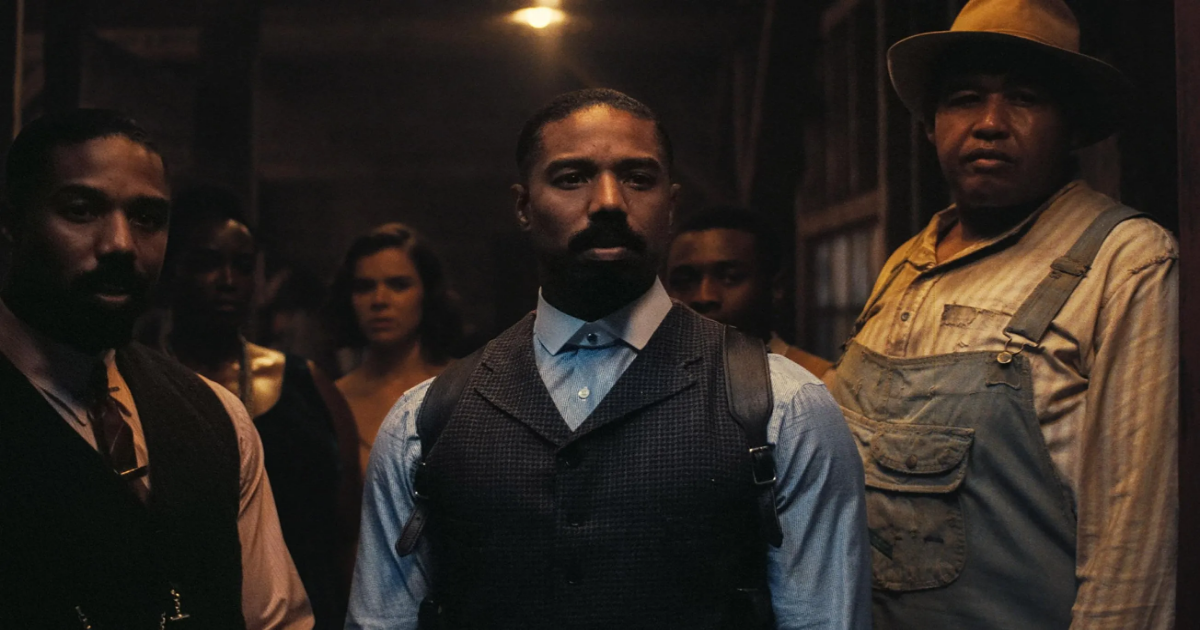For the entirety of his career so far, there has been some consternation over Ryan Coogler’s gifts as a director. His major debut Fruitvale Station was admirable and exciting, but was also a classic first-time director indie film. Creed was a lightning-rod moment: the revitalization of a dormant and dead-seeming IP in Rocky, the comeback of Sylvester Stallone as serious actor, and the validation of both Coogler and his muse Michael B. Jordan as Hollywood mainstays. But it is IP, and it is as much about the Rocky formula as it is about the filmmakers. And, obviously, there were Marvel’s Black Panther films, which for all of their virtues remain Marvel films. Coogler, like a lot of talented, capable young filmmakers, got quickly nabbed by the Hollywood system, and good for him, but there has always been a question about what he can do with his own purely original work. Finally, with Sinners, Coogler has put his decade of experience behind his own idea.
Sinners tells the story of twin brothers Elijah “Smoke” Moore and Elias “Stack” Moore (both played by Michael B. Jordan), bootlegging gangsters and WWI veterans returning home to the Mississippi Delta from Chicago in 1932. It’s the opening of their new juke joint built out on former Klan property, and they plan to start off strong with music from their little cousin, Sammie a.k.a. Preacher Boy (Miles Caton), and local blues legend Delta Slim (Delroy Lindo). They have also employed Smoke’s former lover Annie (Wunmi Mosaku) and Chinese shopkeepers Grace and Bo Chow (Li Jun Li and Yao, respectively). But later on in the night, everyone there gets more than they bargained for when the power of the blues seems to open a portal to hell and attract a legion of vampires, led by Irish immigrant Remmick (Jack O’Connell), who systematically picks off the entire party in pursuit of Preacher Boy and his ability to commune with the ancestral spirit through his music.
That might seem like a lot, and it is. Sinners is surprisingly dense for what on its face seems to be a gory vampire thriller. It’s incredibly well-researched and specific about the Mississippi Delta, Jim Crow, the history of Buddy Guy, the economy of these former slave colonies, and the pressures brought by a burgeoning immigrant class. It deals in things like race and class and gentrification and the vampiric nature of consumption, but it also muddies the conversation and defies expectations. As you can probably guess from that synopsis above, Sinners runs through a gamut of influences, from things like From Dusk Till Dawn and Salem’s Lot to Coogler’s own oeuvre, particularly the Black Panther movies.
Which isn’t to say this is Coogler’s own version of a Marvel-style movie. In fact, it would be better to compare Sinners to the target Coogler clearly hopes to aim for: Christopher Nolan. Coogler has been very open about his admiration for Nolan for a while, and Sinners captures both what Nolan does well and what he doesn’t. Sinners is heavy on themes and expository language, and attempts to push the capabilities of big-time filmmaking to its fullest extent, sometimes to its detriment. The movie is an ambitious, exhaustive swing at greatness, and its imperfections are just as interesting as what it gets right.
And it gets a lot right. Jordan is as compelling as he’s ever been, doing double duty here, but it’s his performance as Smoke that really levitates. His rapport with Mosaku gives the movie much of its heart and soul. Its action set pieces are very easily going to be some of the best you’ll see this year and it’s shot beautifully on 70 mm and IMAX. The centerpiece musical number in the film will almost certainly divide audiences—as it divided me—but it will do so in a way that makes it ripe for discussion. Speaking of Nolan, it most reminded me of Oppenheimer’s time-traversing sex scene; a director with an ambitious idea that may have sounded better than it actually looked in action. It’s not easy to take big risks in blockbusters anymore, and I have to admire Coogler for doing so.
But even with the successful opening weekend Sinners had, there’s still plenty of discourse around its viability, most notably in a Variety piece that—without sounding conspiratorial—seems very obviously planted. This happens a lot, particularly in the last few years, when a big-name auteur or star uses their cache to nab a big budget for an original film. Coogler rubbed some Warner Bros. executives the wrong way when it was announced that, along with final cut and a percentage of the gross, he also gets complete ownership of the film in 25 years. So it’s not surprising that someone in a studio executive suite wants the moviegoing public to be convinced that “passion projects” don’t make any money, and that it’s better for the movie economy to continue being fed IP slop or, better yet, AI slop. There also seems to be a little condescension at play towards the concept of a successful black-led and -made film, as though it flies in the face of the narrative that America has turned its back on diversity and multiculturalism. But the plain fact is Sinners made a big splash as an R-rated, mostly black horror film, and the haters will just have to deal with it being Ryan Coogler’s world a little bit longer.
